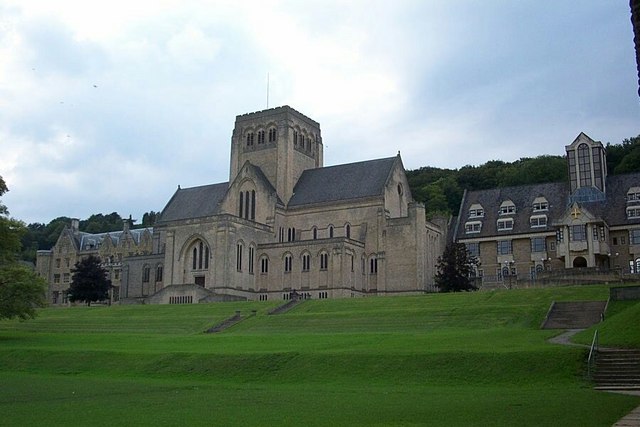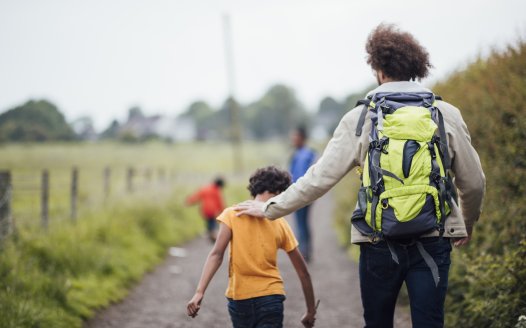Child protection must come before the reputation of institutions like Ampleforth and Downside
Posted: Thu, 9th Aug 2018 by Richard Scorer
Richard Scorer says a damning report on two leading Catholic schools' approach to safeguarding is a reminder of the need for a law mandating the reporting of suspected child abuse to the secular authorities.
At the end of 2017 the Independent Inquiry into Child Sexual Abuse (IICSA) heard three weeks of evidence about the sexual abuse of children at two leading Catholic schools, Ampleforth and Downside, and the monasteries associated with them. These institutions are run by the English Benedictine Congregation, a socially elitist Catholic monastic order. Over many decades the schools and the monasteries have been implicated in sexual abuse scandals leading to numerous criminal convictions of monks and teachers. IICSA's report on Ampleforth and Downside was published today. What did it conclude, and what happens now?
Today's report looks at the history of sex abuse scandals at the two institutions from the 1960s to the present day. This period included the two major Catholic Church reports which were supposed to transform safeguarding in Church institutions - the Nolan report in 2001 and the Cumberlege report in 2007. The report is a devastating indictment of decades of institutional abuse and deliberate cover up. But more than that, it confirms that the failings identified are not simply historic: there are serious problems in both institutions even now.
Amongst the report's conclusions were that:
"The true scale of sexual abuse of children in the schools that occurred over 40 years is likely to be considerably greater than numbers cited in the criminal convictions (i.e. of monks and teachers)."
"In the matter of child protection, monks in both institutions were often very secretive, evasive and suspicious of anyone outside the English Benedictine Congregation. For decades, they tried to avoid giving information, other than what was specifically requested, to the statutory authorities, that might have assisted the investigation of abuse of children in their care."
"Even after the Nolan report, when monks were obliged to work with statutory authorities and gave the appearance of cooperation and trust, their approach could be summarised as a "tell them nothing" attitude."
"Both Ampleforth and Downside prioritised the monks and their own reputations over the protection of children, manoeuvring monks away from the schools in order to avoid scandal. The known risk of child sexual abuse was thus transferred to other locations. Those who received them would sometimes not be adequately informed of the risk, with the result that constraints on access to children were not fully enforced."
With regard to the Nolan report, "we heard no evidence that demonstrated that Downside and Ampleforth did any more than pay lip service to it. There was hostility to the Nolan report in both institutions… they seemed to take the view that its implementation was neither obligatory nor desirable. This view appeared to go unchallenged in the wider Catholic Church."
"Neither Ampleforth nor Downside has formally established a comprehensive redress scheme, financial or otherwise, and other than in the context of this inquiry, no public apology has been made."
Perhaps most seriously, today's report concluded that "it is clear to us from all the evidence we have heard during this inquiry that several systemic child protection and safeguarding challenges remain at Ampleforth and Downside to this day".
What happens next? Of the two schools examined in this report, Ampleforth already faces possible closure because of child protection failings. Earlier this year, the Charity Commission removed pupil safeguarding responsibilities from the school over its concerns. Then in May 2018 the Department of Education wrote to Ampleforth and its prep school St Martin's serving notices requiring that the schools submit action plans to address their failings and warning that if the action plans are inadequate then "the secretary of state may remove the school from the register of independent schools or may impose a requirement restricting the school's operations". In the meantime Ampleforth's headmaster has been suspended from the Headmasters' and Headmistress' Conference (HMC). So the situation at Ampleforth will probably crystallise quite quickly. With today's report, Downside will also be under the spotlight. Given the recent announcement by the Charity Commission that safeguarding is now to be treated as a priority in charity governance, this report begs serious questions about whether Benedictine institutions merit continued charitable status.
What does the report mean for the Catholic Church as a whole? The Benedictines are one of two case studies within IICSA's Catholic investigation. A hearing later this year will examine the archdiocese of Birmingham, and only then will IICSA reach definitive conclusions about the wider church. But we already know how the Catholic Church is likely to respond to today's devastating report: it is likely to argue that the appalling failings in Benedictine schools are not representative of the wider church. A few weeks ago I wrote a piece for The Tablet, the independent Catholic magazine, describing the evidence unearthed by IICSA and talking about the profound cultural changes now required if the Catholic church is to overcome its current scandals. The chair of the Catholic Council for IICSA, Baroness Nuala O'Loan, responded by accusing of me of extrapolating "from the particular to the general". The Benedictines, she claimed, "cannot be representative of the whole Church, because of the distinctive nature of monastic life. In the parishes and dioceses of the Catholic Church in England and Wales, safeguarding is now a fundamental part of our culture."
If this is the church's response, it simply will not do. Whilst the December hearing focused on the Benedictines, IICSA heard from witnesses who have been involved in safeguarding across the whole church, and their evidence was damning. Jane Dziadulewicz, the former head of safeguarding for the Clifton diocese, told the inquiry: "The Catholic Church's PR machine likes to point out that it has these policies and procedures in place, but in many cases, individual bishops and clergy (although not all) resist those policies. I experienced many times when I would explain a policy had been agreed by bishop's conference only to be told that bishops had not read those policies or did not agree with them." She also stated: "I think there is a huge problem around accountability, and this problem - the problem within the Catholic Church has been going on for years. I think, unless a way can be found to ensure that bishops and religious leaders have no choice but to apply policies and procedures, we will continue to have problems in managing individuals accused of abuse and in keeping children safe within the Catholic Church…. I think perhaps there needs to be some kind of body that holds the church accountable, which could result in financial fines or criminal sanctions if these policies and procedures aren't applied... There is just nothing. The church ultimately doesn't have to do these things if it doesn't want to….. Once this inquiry is over, if nothing happens as a result of this inquiry, the church can continue in the way it's continued for years… and the same problems will arise where offenders will be able to target children and abuse again."
Eileen Shearer, the former director of the Catholic Office for the Protection of Children and Vulnerable Adults (COPCA) spoke of the obstacles she encountered: "Priority seemed to be given, often, too often, to protecting the institution from open scandal and to dealing with things in-house, a mistrust of the statutory authorities, and there seemed to be a lack of awareness of their own lack of knowledge in a way, so that they were not open to accepting advice or receiving training and development." Adrian Child, Shearer's successor as head of COPCA and its successor the Catholic Safeguarding Advisory Service (CSAS), was clear: "The Catholic Church has had two excellent opportunities (i.e. with Nolan and Cumberlege) to get safeguarding right on a kind of… goodwill, internal basis, and whilst I think there's been a huge amount of effort by a lot of very good people within the church, and I include some bishops and religious leaders in that, they haven't got it right, and that's in a 15-year period. So I don't see any value in tinkering around the edges and saying, 'Here you are. Here is a third opportunity. Go away and sort this out yourself'… There needs to be accountability and some kind of mandatory enforcement".
These witnesses – critical friends of the church, who have tried to change it from the inside – were not just talking about the Benedictines, they were talking about the wider church as well. In truth, there are deep seated cultural reasons why the Catholic Church has so many abuse scandals: its preferencing of external reputation over the protection of children; the belief that ordination makes priests superior to laity; reliance on canon law and the absolute seal of the confessional; a patriarchal power structure; mandatory celibacy; and misconceived ideas about forgiveness. Although the church has changed its internal procedures, none of these underlying problems have been addressed. Nor are they likely to be: despite five decades of scandal, Catholic leaders have shown no appetite for a serious reappraisal of the factors which led to this crisis.
Today's report relates to one part of IICSA's Catholic investigation, and so formal recommendations for future action will need to await the completion of other case studies. But as I and many other campaigners have argued, the temptation to cover up abuse which seems to permeate the whole Catholic Church can only be tackled through reform of the law – by introducing a mandatory requirement to report knowledge or suspicion of abuse to the statutory authorities, so that it can be properly investigated.
No such legal requirement currently exists in the UK, a fact that rightly astonishes many people: earlier today, when I was interviewed by John Humphrys on BBC Radio 4's Today programme, he was clearly flabbergasted to discover that an institution charged with the care of children could decide to sit on knowledge or suspicion of abuse and not report it on. This needs to change. This will be an issue for IICSA to consider in future reports. For today, I pay tribute to the many brave survivors who spoke out about this appalling abuse, and express the hope that their courage will lead to the changes necessary to protect future generations.
You can read the Independent Inquiry into Child Sexual Abuse report into the Ampleforth and Downside hearings, as part of its investigation into the Roman Catholic Church, here.
Image: Ampleforth Abbey and College, © Elliott Simpson [CC BY-SA 2.0]
While you're here
Our news and opinion content is an important part of our campaigns work. Many articles involve a lot of research by our campaigns team. If you value this output, please consider supporting us today.








